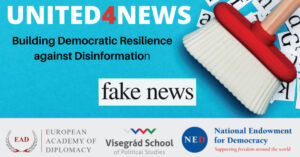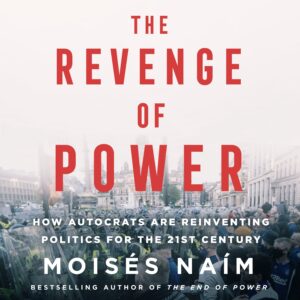He writes that “3P” power is “malign … incompatible with the democratic values at the center of any free society.” Its danger lies in the slow way leaders transform societies that are already undergoing rapid change. ….. Naím [a former National Endowment for Democracy (NED) board member] wants to be hopeful about the potential for little-D democrats — citizens and governments alike — to combat autocracy. He lays out five battles we need to win (against falsehoods, criminalized governments, foreign subversion, political cartels and illiberalism) and hopes that the world’s democracies can come together to articulate the promises of democratic life.
 The fight against falsehoods was the subject of a symposium panel moderated by Eileen Donahoe, executive director of Stanford’s Global Digital Policy Incubator, and addressed by former US President Barack Obama.
The fight against falsehoods was the subject of a symposium panel moderated by Eileen Donahoe, executive director of Stanford’s Global Digital Policy Incubator, and addressed by former US President Barack Obama.
“Autocrats like Putin have used [social media] platforms as a strategic weapon against democratic countries that they consider a threat,” he said.
During the 1960s and 1970s, the American public tuned in to one of three major networks, and while media from those earlier eras had their own set of problems – such as excluding women and people of color – they did provide people with a shared culture…. Fast forward to today, where everyone has access to individualized news feeds that are fed by algorithms that reward the loudest and angriest voices (and which technology companies profit from). “You have the sheer proliferation of content, and the splintering of information and audiences,” Obama observed. “That’s made democracy more complicated.”
Tech companies have made democracy more vulnerable, Obama said, adding that they should “redesign” themselves to protect the public from the spread of disinformation.
“Very specific choices” by tech companies, he said, “intentionally or not have made democracies more vulnerable.”

Credit: Rappler
“I became a journalist because information is power,” said 2021 Nobel Peace Prize laureate and investigative journalist Maria Ressa (right), co-founder of the digital news site Rappler. “When information is wrong or when the tech platform that delivers the news is biased against facts or they don’t distinguish – it’s like introducing a virus and then everyone getting infected by it.”
Ressa said the Philippines is an example of how an assault on the truth and facts can harm civic engagement and eventually destroy democracy, she told a panel moderated by Marietje Schaake, the Cyber Policy Center’s international policy director. “You cannot have integrity of elections if you don’t have integrity of facts. And we don’t have integrity of facts.”
“I think the only option you have right now, that needs to kick in, is regulation and it should not be downstream at content moderation. It should be at the algorithmic level and at the [level of] surveillance capitalism,” which refers to the concept of tracking customers’ personal data for profit. RTWT

 Savvy autocrats have deployed the three P’s of populism, polarization and post-truth to cultivate ‘stealthocracy’ – maintaining liberal democracy’s institutional architecture while gutting the substance of such norms as accountability, civility and pluralism,
Savvy autocrats have deployed the three P’s of populism, polarization and post-truth to cultivate ‘stealthocracy’ – maintaining liberal democracy’s institutional architecture while gutting the substance of such norms as accountability, civility and pluralism, 





